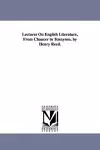
Lectures On English Literature, From Chaucer to Tennyson. by Henry Reed.
Henry Reed - Paperback
£14.47
Henry Reed (1914-86), was born in Birmingham and educated at King Edward VI School and Birmingham University, where he studied language and literature and wrote an MA thesis on Hardy. He worked as a teacher and freelance journalist, 1937-41. After a short period in the army he was transferred to the Foreign Office to work in Naval Intelligence, 1942-5. Thereafter Reed made his career in radio as a journalist, broadcaster, and playwright. The BBC's Third Programme was inaugurated in October 1946, and he became a member of the legendary group of writers--including Louis MacNeice, Dylan Thomas, Terence Tiller, P. H. Newby, Patric Dickinson, W. R. Rodgers, and Rayner Heppenstall--who were attached to the network during its golden period. His most memorable set of productions was the Hilda Tablet series in the 1950s. Later he was a visiting professor and associate professor of English at the University of Washington, Seattle. He was called up to the Army in 1941, spending most of the war as a Japanese translator. Reed also worked for many years on a biography of Hardy, which he never finished. Reed's most famous poem is Naming of Parts, a witty parody of army basic training. Published in A Map of Verona in 1946, it was his only collection to be published within his lifetime. Another anthologised poem is Chard Whitlow, a clever satire of T. S. Eliot's Burnt Norton.